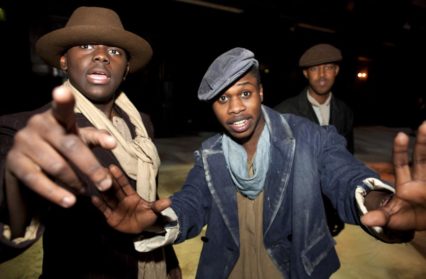Dylan Moore journeys’ around Butetown, past and present, in National Theatre Wales‘ latest production – The Soul Exchange.
‘Where to, bro?’
Words uttered how many times by how many taxi drivers how many times over how many years? How many pick-ups and drop-offs? And how many dramas these cabbies must have seen in between. Who better, then, to eavesdrop as we discover secret histories in a place with as rich a heritage as any district in the world: Cardiff’s former docklands, the place they used to call Tiger Bay.
Tiger Bay, The Docks, Butetown, The Bay. What you call this place reveals much about who you are. Romantic, historian, local, tourist. The Soul Exchange is, fittingly, a reflection of the area itself: a collaboration between director Kully Thiari and three young artists from Manchester’s Contact Theatre, National Theatre Wales’ own creative team and various Butetown creatives including writer Anthony Brito. The audience is an equally diverse mix of locals and visitors, old and young, scarf-wearing theatre aficionados and hoodied youths.
Handed our passes to ‘pass through the Dock Gate and return on temporary Shore Leave’ at the Wales Millennium Centre, we are reminded in bold letters that this is the Port of Cardiff. The uncertainty of our wait gives us a genuine feeling of emigrants. We mill about. We are ordered into lines. Our bags are checked, our photos taken. We are not allowed to smile.
Outside the Millennium Centre is the Oval Basin, fashioned out of the old docks, decked in wood and shaped like a ship. This is where we board our ‘ship’, L’Afrique, which turns out to be a fleet of Cardiff’s Dragon taxis. Circumnavigating the streets of Butetown, shuttered shops and high-rise towers having long since replaced the tight-knit terraces we see on Gavin Porter and Kyle Legall’s evocative visuals, we hear a radio play in which a young man asks a taxi driver to take him to Peel Street, to meet an Abdi Mahmoud. Neither the street nor the man seem to exist; histories – social and personal – are written and rewritten here.
My name is Abdi Mahmoud. I became Peter Watkins and now I am known as Old Tiger. That is the way of this place.
– From a letter ‘To my lost son’
Abdi, Peter, Tiger. A personification of this famous old melting pot. We follow his lost son up Bute Street, where sharp-suited men gamble with dice; our taxi slows near the Loudon Square flats, where figures move on the lighted stairs and we meet an old lady called Vera. It is like an episode of ‘Who Do You Think You Are?’ – a potent mix of personal and social histories. We learn – or are reminded – that this was a place of gamblers and dealers, singers and prostitutes, drinkers and sailors, lovers and fighters, barmaids and thieves. It is a place of churches and nightclubs, mosques and all-night cafes, contradictions and conglomerations. When we finally reach the Coal Exchange, and the funeral marking the end of the night, our protagonist’s father is described as a ‘feckless father, generous giver and entrepreneur . . . always ready to make a fast buck, but always ready to share. There’s good and bad in all of us,’ we’re told. But here – in Tiger Bay, Butetown, the Docks – and in Old Tiger himself, ‘the good outweighed the bad’.
Tiger Bay was an accident of the age of capital, industry and empire, notable then because it was an exception; in our age of globalization, the world itself is becoming more like Tiger Bay – and all the better for it.
The same could be said for the piece itself. There are significant shortcomings, not least because of what has happened to the area itself, certainly in terms of the built environment. ‘They knocked down our homes, but we try and carry on, as best we can, you know,’ one of the denizens circulating the audience tells me. At first our taxi ride seems genuinely evocative of the Old Bay, the staged scenes and the multi-racial nature of the area itself combining to create glimpses of how things might have been had the Cardiff Bay Development Corporation not got their hands on the place to ‘regenerate’ in the manner of any other post-industrial city. But in travelling around the rest of the area, we are reminded not so much of the old days and the old Bay, but the new: our aural journey into the past is accompanied by reminders outside the window that this is now a place of hotels and ‘luxury’ housing developments, retail parks, roundabouts and restaurants. It is ironic that the word most often used to describe much of the area celebrated by The Soul Exchange is ‘soulless’.
Still, it was the people of Tiger Bay and not the conditions in which they lived that made the place so special – and it is the people who make the place what it is today. Participating in the ‘Butetown Electric Shuffle’ at the end of Old Tiger’s funeral, one couldn’t help but notice the fun that people were having. Was this theatre, or just life?
Tempus Fugit
– inscription on the clock at The Coal Exchange
And at the end of the evening, when we all posed for a photo, we recorded for posterity not just a moment in time, but a kind of reclamation. This was the building where the world’s first million pound cheque was signed. In the photo to mark that occasion, the hall was packed with rich white men with moustaches and hats. This time, we were of all ages and races and genders. Tiger Bay was an accident of the age of capital, industry and empire, notable then because it was an exception; in our age of globalisation, the world itself is becoming more like Tiger Bay – and all the better for it.












